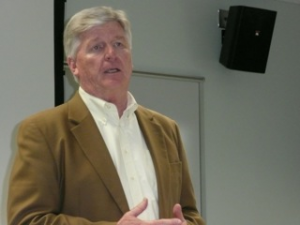Guest speaker: Tom O’Connor
16 04 2011Photo courtesy of Steve Klein
Tom O’Connor, the athletic director at GMU talked about what it takes to be involved with a division I athletics program and what he expects out of his student-athletes.
What should intercollegiate athletics be about?
- Quality and balance. Be the best, meaning not only on the playing field but also in the classroom.
- Sportsmanship — the core value of intercollegiate athletics.
Sportsmanship involves yelling at the refs, getting a technical foul, etc.
- Have fun. The athletics department is similar to the “toys and games department” at a retail store.
Why?
Because it’s fun. Everybody enjoys going into the toys and games department and O’Connor wants everybody to feel the same involving athletics.
He referenced sports as a “side door” rather than the “main door” of the university. He truly believes that learning in the classroom is the main door and the most important aspect of being in a university.
The memorable 2006 Final Four run helped bring visibility to GMU and brought indirect marketing to the university with around $1 billion in free marketing and advertisement.
At first the criticism and attention that GMU had was negative from the media and as they had success, it turned into positive attention.
The sports budget — which I was apparently confused about — is frozen, not cut. All the money that the athletics has comes from people who pay to watch and also from outside donations. The coaches salaries and scholarship money was not cut. It stayed the same. But rather than flying to Dallas to play a team, they will just go to Baltimore to play someone else instead. O’Connor wants to focus on getting the basic human needs fulfilled first and foremost before anything else.
These are:
- Clothing
- Shelter
- Food
- Good equipment to play with
For GMU to have a football team, the money would come from student fee’s rather than tuition. But at this point in time, O’Connor hasn’t received the necessary funding from alumni to begin a football program at Mason. And if it does, he wants it to be big-time.
Let’s not think small. Think big.
Tags : 2006 Final Four, GMU, intercollegiate athletics, Tom O'Connor
Categories : Guest Speakers
